17th century music

81 products
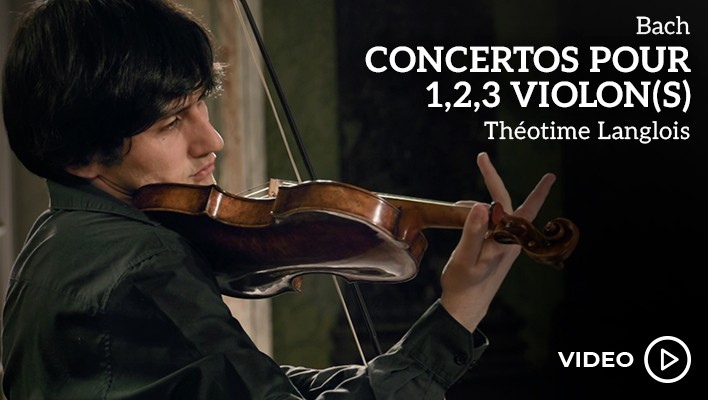
Bach : Concertos for 1,2,3 violin(s)
Bach : Concertos for 1,2,3 violin(s)
Free accessThéotime Langlois de Swarte conducts a concert devoted to Bach’s violin concertos with the Orchestre de l’Opéra Royal. These Baroque works combine virtuosity and expressiveness. They showcase Bach’s genius at the court of Köthen.

Bach/Charpentier : Noël baroque
Bach/Charpentier : Noël baroque
Free accessJohn Eliot Gardiner celebrates the Christmas period with works by two giants of European sacred music : Johann Sebastian Bach and Marc-Antoine Charpentier.
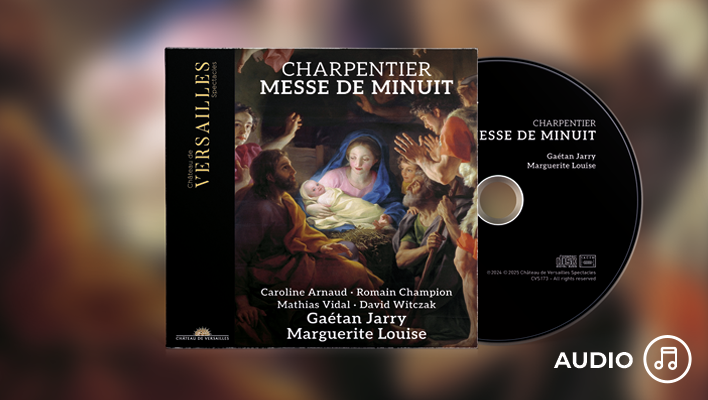
Charpentier : Messe de Minuit
While the Te Deum brought Charpentier fame, the Messe de Minuit fully showcases his genius, gracefully blending the sacred and the secular. Inspired by popular melodies, it captivates with its freshness, joy, and refinement. Gaétan Jarry and the ensemble Marguerite Louise bring out its fervour and the true spirit of Christmas.
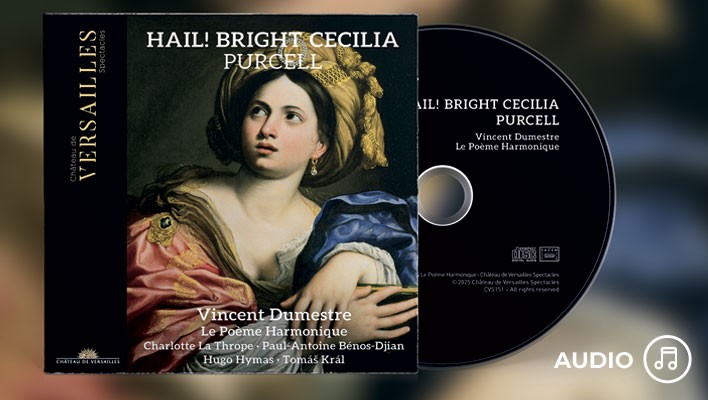
Purcell : Hail ! Bright Cecilia
Purcell : Hail ! Bright Cecilia
With Hail! Bright Cecilia, Purcell honours the patron saint of music in a magnificent ode that epitomises the English Baroque. Composed in 1692, it captures the artistic vitality of seventeenth-century England. Vincent Dumestre and Le Poème Harmonique bring out its full expressive richness in a performance both vibrant and finely nuanced.
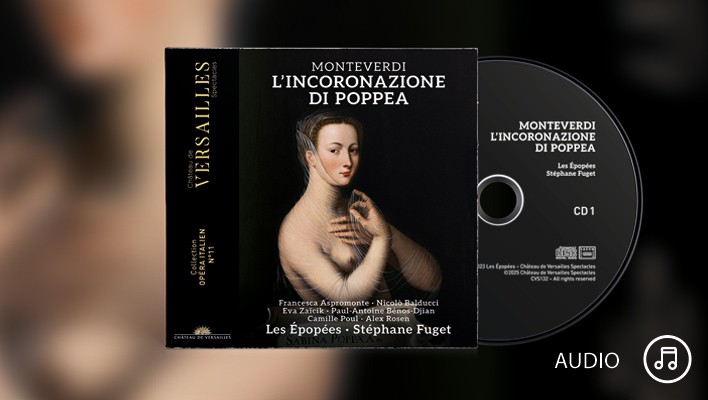
L’Incoronazione di Poppea
Poppaea, Nero’s mistress, wields manipulation and cruelty to attain power, orchestrating intrigues and deaths around her. Under Monteverdi’s music and Stéphane Fuget’s direction, her rise becomes a mesmerizing celebration of limitless desire and ambition.
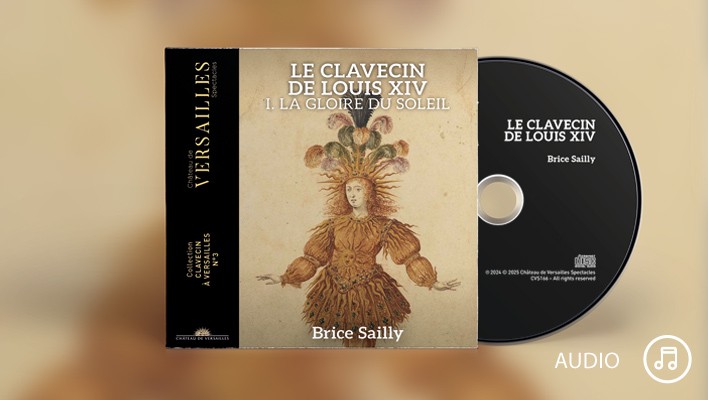
Le Clavecin de Louis XIV
This work evokes Louis XIV’s musical awakening to the harpsichord, in the company of the most celebrated musicians of his time. At that period, French harpsichord making was flourishing, notably thanks to Chambonnières, who published the first printed scores in 1670. This diverse repertoire reflects the richness of the Grand Siècle, beautifully brought to life by Brice Sailly’s performance.
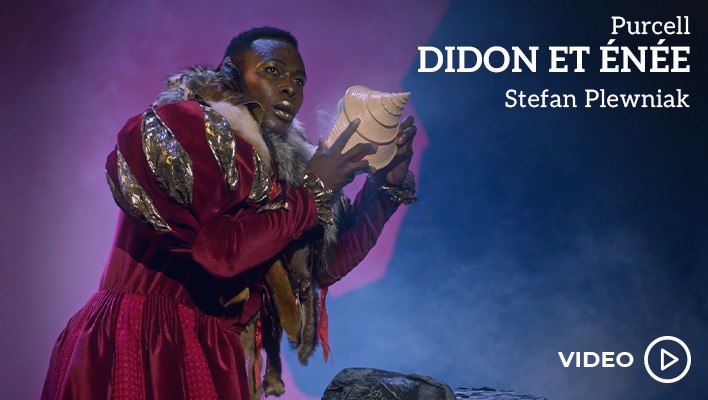
Purcell : Dido and Aeneas
Purcell reaches the pinnacle of English music with Dido and Aeneas, a lyrical tragedy of love and fate. In Versailles, Sonya Yoncheva and Halidou Nombre perform under the poetic staging of Cécile Roussat and Julien Lubek.
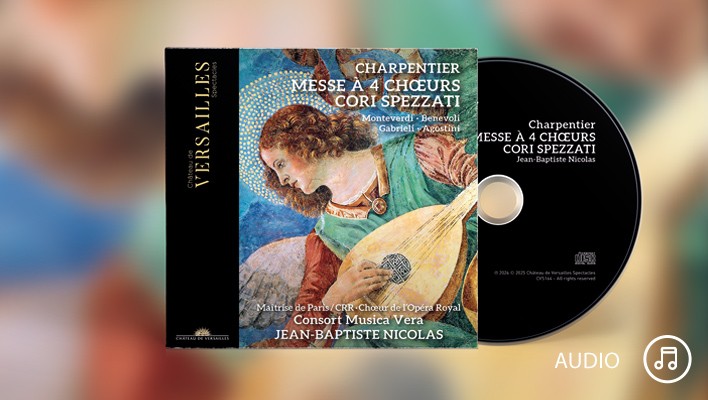
Charpentier : Messe à 4 Chœurs · Cori Spezzati
Charpentier : Messe à 4 Chœurs · Cori Spezzati
Charpentier's Messe à quatre chœurs combines French tradition with Italian Baroque, creating a dynamic interplay between four ensembles. Jean-Baptiste Nicolas brings a performance that balances precision and emotion.

Jean-Baptiste Lully - Atys
Atys stands as the pinnacle of Lully's triumph, having become the opera of the King. The piece weaves love as its central thread, blending human and divine passions through the tragic fates of Atys and Cybèle. Leonardo García-Alarcón conducts this rendition with a subtlety that brings out the full beauty of Lully's music.

Lully - Atys
Atys stands as the pinnacle of Lully's triumph, having become the opera of the King. The piece weaves love as its central thread, blending human and divine passions through the tragic fates of Atys and Cybèle. Leonardo García-Alarcón conducts this rendition with a subtlety that brings out the full beauty of Lully's music.

Atalia
After eliminating the royal family, Atalia takes control of Jerusalem. Seven years later, the High Priest and his allies restore the young Joas to the throne. Emmanuel Resche-Caserta and Ensemble Hemiolia bring this powerful oratorio to life, where justice and innocence ultimately prevail.

Alceste ou Le Triomphe d'Alcide
Alceste ou Le Triomphe d'Alcide
In 1674, Lully and Quinault premiered Alceste, a tragic opera that blends Greek mythology with Baroque style, which was met with success at the court of Louis XIV. The opera played a key role in establishing tragic opera as a major genre. Stéphane Fuget, with Les Epopées and the Chœur de l’Opéra Royal, masterfully brings this world of love and sacrifice to life.

Charpentier - Missa Assumpta Est Maria
Charpentier - Missa Assumpta Est Maria
At the height of his artistry, Marc-Antoine Charpentier composed Assumpta est Maria around 1669, a mass that blends Italian influences with the French style. Combining devotion and virtuosity, it remains a masterpiece of Baroque sacred music. Gaétan Jarry and the Marguerite Louise ensemble deliver an expressive and solemn interpretation.

Apparatus musico-organisticus
Georg Muffat's Apparatus musico-organisticus, published in 1690, showcases his genius by blending European styles and exploring the baroque organ. Bernard Foccroulle brings out the splendour of the toccatas on a French organ, accompanied by Marie Rouquié for the Sonata a violino solo.

Monteverdi - Vespro Della Madonna
Monteverdi - Vespro Della Madonna
At the end of his life, Monteverdi gathered all of his works to guide musicians during religious services. This composer, who shaped sacred music for nearly a century, is now celebrated by Vincent Dumestre and Le Poème Harmonique, who have created a program for him that resonates like his musical testament.

La Naissance de Versailles
In 1607, Louis XIII discovered Versailles with his father, Henry IV, and began constructing a hunting lodge there in 1623. Jean-Baptiste Nicolas envisioned a religious ceremony to mark this occasion, featuring the Grand Mass of Formé, motets, resounding fanfares, and choirs for a grand musical celebration.

Suites à la mémoire d'un poète
Suites à la mémoire d'un poète
The timeless music of 17th-century theorbo master Robert de Visée still captivates audiences today, while enthusiasts like Thibaut Roussel delve into the mysteries of his life. Their performances transport listeners straight into the lively, elegant soirées of Louis XIV's court.

The Crown
Free access
On the occasion of the Coronation of King Charles III, here is the most famous music from the coronations of James II in 1685 and George II in 1727. Purcell's and Handel's masterpieces exude an extraordinary evocative power, perfectly suited to the Royal Opera Chorus and Orchestra conducted by Gaétan Jarry.

Lully - Armide
Armide was Lully and Quinault's last lyric tragedy, and is considered their greatest dramatic achievement. Vincent Dumestre conducts this spellbinding masterpiece, buoyed by Stéphanie d'Oustrac's masterful interpretation.

Bach : Concertos for 1,2,3 violin(s)
Bach : Concertos for 1,2,3 violin(s)
Free accessThéotime Langlois de Swarte conducts a concert devoted to Bach’s violin concertos with the Orchestre de l’Opéra Royal. These Baroque works combine virtuosity and expressiveness. They showcase Bach’s genius at the court of Köthen.

Bach/Charpentier : Noël baroque
Bach/Charpentier : Noël baroque
Free accessJohn Eliot Gardiner celebrates the Christmas period with works by two giants of European sacred music : Johann Sebastian Bach and Marc-Antoine Charpentier.

Charpentier : Messe de Minuit
While the Te Deum brought Charpentier fame, the Messe de Minuit fully showcases his genius, gracefully blending the sacred and the secular. Inspired by popular melodies, it captivates with its freshness, joy, and refinement. Gaétan Jarry and the ensemble Marguerite Louise bring out its fervour and the true spirit of Christmas.

Purcell : Hail ! Bright Cecilia
Purcell : Hail ! Bright Cecilia
With Hail! Bright Cecilia, Purcell honours the patron saint of music in a magnificent ode that epitomises the English Baroque. Composed in 1692, it captures the artistic vitality of seventeenth-century England. Vincent Dumestre and Le Poème Harmonique bring out its full expressive richness in a performance both vibrant and finely nuanced.

L’Incoronazione di Poppea
Poppaea, Nero’s mistress, wields manipulation and cruelty to attain power, orchestrating intrigues and deaths around her. Under Monteverdi’s music and Stéphane Fuget’s direction, her rise becomes a mesmerizing celebration of limitless desire and ambition.

Le Clavecin de Louis XIV
This work evokes Louis XIV’s musical awakening to the harpsichord, in the company of the most celebrated musicians of his time. At that period, French harpsichord making was flourishing, notably thanks to Chambonnières, who published the first printed scores in 1670. This diverse repertoire reflects the richness of the Grand Siècle, beautifully brought to life by Brice Sailly’s performance.

Purcell : Dido and Aeneas
Purcell reaches the pinnacle of English music with Dido and Aeneas, a lyrical tragedy of love and fate. In Versailles, Sonya Yoncheva and Halidou Nombre perform under the poetic staging of Cécile Roussat and Julien Lubek.

Charpentier : Messe à 4 Chœurs · Cori Spezzati
Charpentier : Messe à 4 Chœurs · Cori Spezzati
Charpentier's Messe à quatre chœurs combines French tradition with Italian Baroque, creating a dynamic interplay between four ensembles. Jean-Baptiste Nicolas brings a performance that balances precision and emotion.

Jean-Baptiste Lully - Atys
Atys stands as the pinnacle of Lully's triumph, having become the opera of the King. The piece weaves love as its central thread, blending human and divine passions through the tragic fates of Atys and Cybèle. Leonardo García-Alarcón conducts this rendition with a subtlety that brings out the full beauty of Lully's music.

Lully - Atys
Atys stands as the pinnacle of Lully's triumph, having become the opera of the King. The piece weaves love as its central thread, blending human and divine passions through the tragic fates of Atys and Cybèle. Leonardo García-Alarcón conducts this rendition with a subtlety that brings out the full beauty of Lully's music.

Atalia
After eliminating the royal family, Atalia takes control of Jerusalem. Seven years later, the High Priest and his allies restore the young Joas to the throne. Emmanuel Resche-Caserta and Ensemble Hemiolia bring this powerful oratorio to life, where justice and innocence ultimately prevail.

Alceste ou Le Triomphe d'Alcide
Alceste ou Le Triomphe d'Alcide
In 1674, Lully and Quinault premiered Alceste, a tragic opera that blends Greek mythology with Baroque style, which was met with success at the court of Louis XIV. The opera played a key role in establishing tragic opera as a major genre. Stéphane Fuget, with Les Epopées and the Chœur de l’Opéra Royal, masterfully brings this world of love and sacrifice to life.

Charpentier - Missa Assumpta Est Maria
Charpentier - Missa Assumpta Est Maria
At the height of his artistry, Marc-Antoine Charpentier composed Assumpta est Maria around 1669, a mass that blends Italian influences with the French style. Combining devotion and virtuosity, it remains a masterpiece of Baroque sacred music. Gaétan Jarry and the Marguerite Louise ensemble deliver an expressive and solemn interpretation.

Apparatus musico-organisticus
Georg Muffat's Apparatus musico-organisticus, published in 1690, showcases his genius by blending European styles and exploring the baroque organ. Bernard Foccroulle brings out the splendour of the toccatas on a French organ, accompanied by Marie Rouquié for the Sonata a violino solo.

Monteverdi - Vespro Della Madonna
Monteverdi - Vespro Della Madonna
At the end of his life, Monteverdi gathered all of his works to guide musicians during religious services. This composer, who shaped sacred music for nearly a century, is now celebrated by Vincent Dumestre and Le Poème Harmonique, who have created a program for him that resonates like his musical testament.

La Naissance de Versailles
In 1607, Louis XIII discovered Versailles with his father, Henry IV, and began constructing a hunting lodge there in 1623. Jean-Baptiste Nicolas envisioned a religious ceremony to mark this occasion, featuring the Grand Mass of Formé, motets, resounding fanfares, and choirs for a grand musical celebration.

Suites à la mémoire d'un poète
Suites à la mémoire d'un poète
The timeless music of 17th-century theorbo master Robert de Visée still captivates audiences today, while enthusiasts like Thibaut Roussel delve into the mysteries of his life. Their performances transport listeners straight into the lively, elegant soirées of Louis XIV's court.

The Crown
Free access
On the occasion of the Coronation of King Charles III, here is the most famous music from the coronations of James II in 1685 and George II in 1727. Purcell's and Handel's masterpieces exude an extraordinary evocative power, perfectly suited to the Royal Opera Chorus and Orchestra conducted by Gaétan Jarry.

Lully - Armide
Armide was Lully and Quinault's last lyric tragedy, and is considered their greatest dramatic achievement. Vincent Dumestre conducts this spellbinding masterpiece, buoyed by Stéphanie d'Oustrac's masterful interpretation.

